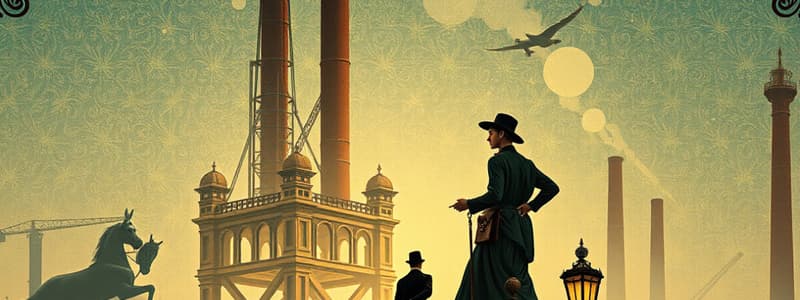Podcast
Questions and Answers
What spurred the Industrial Revolution?
What spurred the Industrial Revolution?
Watt's steam engine, Cartwright's power loom, and Whitney's cotton gin.
Who were the leaders during World War I?
Who were the leaders during World War I?
Clemenceau of France, Lloyd George of England, Nicholas II of Russia, Wilhelm II of Germany, and Wilson of the U.S.
Which countries were Allies during World War I? (Select all that apply)
Which countries were Allies during World War I? (Select all that apply)
- Russia (correct)
- France (correct)
- Great Britain (correct)
- Italy
How did World War II begin?
How did World War II begin?
Who were the AXIS leaders during World War II?
Who were the AXIS leaders during World War II?
What was established after the League of Nations failed?
What was established after the League of Nations failed?
Who led UN troops during the Korean War?
Who led UN troops during the Korean War?
What action did President Johnson take in 1965 regarding the Vietnam War?
What action did President Johnson take in 1965 regarding the Vietnam War?
Who worked together to end the Cold War in the 1980s?
Who worked together to end the Cold War in the 1980s?
What significant event happened in Eastern Europe in 1989?
What significant event happened in Eastern Europe in 1989?
What did President Bush do during the Gulf War in 1990?
What did President Bush do during the Gulf War in 1990?
What major change occurred in South Africa in 1994?
What major change occurred in South Africa in 1994?
Flashcards are hidden until you start studying
Study Notes
Industrial Revolution
- The Industrial Revolution began in the 1760s, marked by significant inventions.
- James Watt developed the steam engine, which revolutionized industry.
- Cartwright invented the power loom, enhancing textile manufacturing.
- Eli Whitney created the cotton gin, boosting cotton production.
World War I Leaders
- Key leaders during World War I included:
- Georges Clemenceau (France)
- David Lloyd George (England)
- Nicholas II (Russia)
- Wilhelm II (Germany)
- Woodrow Wilson (United States)
- The war started in 1914 and concluded in 1918.
World War I Countries
- Major Allied Powers: Great Britain, France, and Russia.
- Central Powers included Austria-Hungary and Germany.
- The United States joined the Allies in 1917, influencing the war outcome.
Beginning of World War II
- World War II commenced in 1939 with Hitler's invasion of Poland.
- The Battle of Midway was pivotal for the U.S. in the Pacific theater.
- Atomic bombings of Hiroshima and Nagasaki in 1945 marked significant U.S. victories.
World War II Leaders
- Key Axis leaders:
- Adolf Hitler (Germany)
- Hideki Tojo (Japan)
- Benito Mussolini (Italy)
- Main Allied leaders:
- Winston Churchill (England)
- Franklin D. Roosevelt and Dwight D. Eisenhower (U.S.)
- Joseph Stalin (USSR)
United Nations
- Established in 1945 following the failure of the League of Nations.
- Founding leaders included President Franklin D. Roosevelt (U.S.), Prime Minister Winston Churchill (UK), and Premier Joseph Stalin (USSR).
Korean War
- The Korean War began in 1950 when North Korea invaded South Korea.
- General Douglas MacArthur led United Nations troops to counter the invasion.
Vietnam War
- The Vietnam War escalated in 1965 with U.S. troop deployment.
- President Lyndon B. Johnson aimed to prevent the spread of communism in South Vietnam.
End of the Cold War
- The 1980s saw collaborative efforts from leaders such as:
- Prime Minister Margaret Thatcher (UK)
- President Ronald Reagan (U.S.)
- Their policies aimed to end the Cold War and promote conservative movements.
Fall of Communism
- In 1989, the decline of communist regimes in Eastern Europe began.
- Soviet President Mikhail Gorbachev did not support Eastern European dictators with military force.
Gulf War
- The Gulf War commenced in 1990, spearheaded by U.S. President George H.W. Bush.
- Coalition forces aimed to expel Iraqi leader Saddam Hussein from Kuwait.
Ending of Apartheid
- Apartheid in South Africa saw a significant shift in 1994.
- President F.W. de Klerk initiated free elections, leading to Nelson Mandela becoming the first black president.
Studying That Suits You
Use AI to generate personalized quizzes and flashcards to suit your learning preferences.




